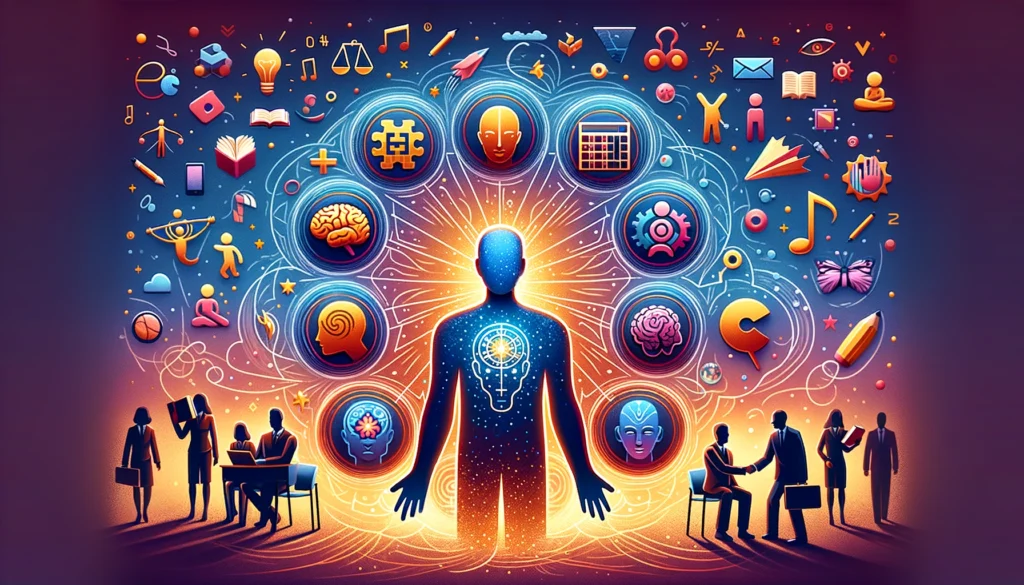Why emotional intelligence is essential for success
- There are seven types of intelligences, though it is possible for people to excel in multiple
- Understanding the different types of intelligences can help you identify where you need more support
- Having a high intrapersonal intelligence, or emotional intelligence, is key to building your financial intelligence and overall success
One thing is certain, people are all different. Each of us has our own natural strengths and weaknesses. In fact, knowing yourself and your strengths and weaknesses is one of the keys to doing well in life.
In 1983, Howard Gardner, a professor at the Harvard Graduate School of Education, published his book, “Frames of Mind: The Theory of Multiple Intelligences.” In the book, Gardner outlined seven intelligences.
Rather than look at intelligence in a narrow way like IQ does, Gardner proposed that people had different intelligences in which they excelled. People didn’t usually excel in just one intelligence but instead had multiple intelligences that they were strong in but also multiple intelligences that they weren’t strong in.
The following are brief descriptions of Gardner’s Seven Intelligences.
Gardner’s seven types of intelligence
-
Verbal-linguistic
People gifted in verbal-linguistic intelligence tend to be good at reading, writing, and memorizing words and dates. They learn best by reading, taking notes, and listening to lectures. These people are left-brain dominant. School is relatively easy if you are strong in this intelligence. Most “A” students are strong in verbal-linguistic intelligence. Many go on to become journalists, lawyers, authors, and doctors.
-
Logical-mathematical
Those gifted with this intelligence do well in math. They are comfortable with numbers, numerical problems, logic, and abstractions. These people are often left-brain dominant. Students with this intelligence also do very well in traditional education environments and often become “A” students. Many go on to be engineers, scientists, doctors, accountants, and financial analysts.
-
Body-kinesthetic
These students are often gifted physically. They tend to learn better by moving around and by doing. This intelligence comes out through the gym, football field, dance studio, acting studio, woodshop, or auto shop. Professional athletes, dancers, actors, models, surgeons, fire fighters, soldiers, police, pilots, race car drivers, and mechanics are often gifted with this intelligence.
-
Spatial
This intelligence is strong in art, visualization, design, and solving puzzles. These people are generally considered right-brain dominant. Students gifted with this intelligence tend not to do well in traditional education environments. They do better in schools that focus on art, design, color, and architecture. These students go on to become artists, interior designers, fashion designers, and architects.
-
Musical
This intelligence is sensitive to music, rhythm, pitch, melody, and timbre. This person often sings and plays musical instruments well. This intelligence does not do well in a traditional education setting. A person with this gift is better off in musical environments of learning, such as schools for the performing arts.
-
Interpersonal
These people are communicators. They are usually popular and extroverts, displaying sensitivity to others’ moods, feelings, temperaments, and motivations. A person gifted with this intelligence often does well in school, especially in popularity contests such as running for student government. These people tend to go into sales, politics, teaching, and social work.
-
Intrapersonal
This intelligence is often called emotional intelligence. This intelligence deals with self-reflection and introspection. Emotional intelligence refers to having a deep understanding of yourself, knowing your own strengths and weaknesses, and what makes you unique, with the ability to handle reactions and emotions. Intrapersonal intelligence is crucial for high-stress environments. In fact, intrapersonal intelligence is critical for success in almost any field or profession.
Building networks of multiple intelligences
While it is important to understand what types of intelligence you are strong and weak in, it is even more important to rely on other people’s strengths to supplement your weaknesses.This is called building a network of multiple intelligences.
For instance, Robert Kiyosaki was not a good student. This is because he was weak in verbal-linquistic and logical-mathmatical intelligence. You might find this odd since he is a best-selling author and teaches on finance, but the key to his success is to surround himself with people who are smarter than him.
As he’s always said, he’s a best-selling author…not writer. Robert has worked for years with other writers and editors to help shape his ideas for his books and articles. They help shape his thoughts with their verbal-linguistic intelligence.
Likewise, while Robert understands the mechanics of finance, you do not want him actually running the numbers. That is why he has great advisors who help him with his accounting, taxes, and more. They use their logical-mathmatical intelligence to help him get richer.
The one intelligence of success everyone must have
This is not to say that he couldn’t learn how to be a better writer or to do his own accounting. He could, but it is not his natural intelligence. Therefore, it’s much better to outsource to others who have those intelligences than to try and develop them himself.
That being said, there is one of Gardner’s types of intelligence that everyone must cultivate if they want to be successful. And that is intrapersonal intelligence.
Intrapersonal intelligence means communicating within yourself—being able to talk to yourself and control your emotions. For example, when someone who is angry says to himself, “Count to ten before you speak,” that person is exercising intrapersonal intelligence. In other words, he speaks to himself before he opens his mouth and lets his emotions speak. This is, unfortunately, not something you can outsource. Thus, it is something you must cultivate.
Intrapersonal intelligence is important for success, especially when times are tough and a person wants to quit or is fearful. In fact, many people who found themselves successful during the coronavirus crisis did so precisely because they cultivated intrapersonal intelligence. They found ways to not only survive but also thrive in the present circumstances. Those who are having a hard time most likely lack such intelligence and are giving into fear.
We all know people who are highly emotional. Rather than think logically, highly emotional people tend to let their emotions run their lives, often saying or doing something they may later regret.
This inability to master the self leads to many struggles and heartaches for people, while those who put intrapersonal intelligence to work are some of the most successful people you know.
Robert’s rich dad, his best friend’s father, always said, “Business and life are team sports,” and one of the keys to success is building a team or network with multiple intelligences to help supplement where you are weak.
Street smarts and emotional intelligence
One of the reasons someone with street smarts can become successful despite not having high book smarts is because they have high intrapersonal intelligence (or, emotional intelligence), which in life is much more important than educational intelligence.
As Rich Dad Advisor, Lisa Lannon wrote: “Education doesn’t teach you how to take risks and how to take a chance on life. It does not prepare you how to take financial risks, or how to achieve financial freedom. And let me tell you, financial freedom will only come when you finally accept that mistakes are learning curves and that risk can be managed.”
In the same way, the most successful people when it comes to money have high emotional intelligence, even if they don’t have high educational intelligence. They have strong street smarts even if they don’t have good book smarts. In short, they are able to overcome fear with their emotional intelligence in order to take the necessary risks needed to increase their financial intelligence and become rich.
Emotional, not emotionless
Emotional intelligence does not mean being void of emotions. Emotional intelligence means you know it is okay to be angry, just not out-of-control angry. You know it’s okay to feel hurt, but it is not okay to do something stupid in the name of revenge.
Many of us know a person who is very intelligent, let’s say in math, but allows their emotions to damage other parts of their lives. Addiction is another example. Addictions are often caused by a lack of emotional intelligence. When frustrated, angry, or fearful, a person may eat, drink, have sex, or do drugs to numb the emotional pain. Some people go shopping when bored, spending money they do not have.
How being emotionally intelligent will prevent disappointment from holding you back
Oftentimes, people who are afraid to try something new, are simply afraid of disappointment. They are afraid they might make a mistake or be rejected.
But the reality is that if you want to be successful in life, not just get by, you need to be able to try new things. And if you do that, be prepared to be disappointed.
In some cases, society has perpetuated the idea that in order to be successful in life, you have to rely solely on your book smarts – even if that means abandoning the street smarts (or, in this case, intrapersonal intelligence). But take note that all of the most successful people have high street smarts either alongside or despite their book smarts.
This is why many successful people dropped out of college but still did well in life, such as Bill Gates, Mark Zuckerberg, and Steve Jobs. It is also why many people with degrees from prestigious universities can be stuck in middle management, dead-end jobs. And, rather than allowing disappointment to hold them back, they continue learning, and use their disappointments as a foundation to build on.
Managing emotions is key to success
Today, take stock in how you manage your emotions. Are you smart in the way you express what you’re feeling, especially when the pressure is on? Or do you let your emotions continually handicap your ability to succeed?
If you want to be successful in life, you must have strong emotional intelligence, which means strong intrapersonal intelligence, because successful people are successful at managing their emotions, especially in stressful situations.
Regards,
Robert Kiyosaki
Contributor, Freedom Financial News




